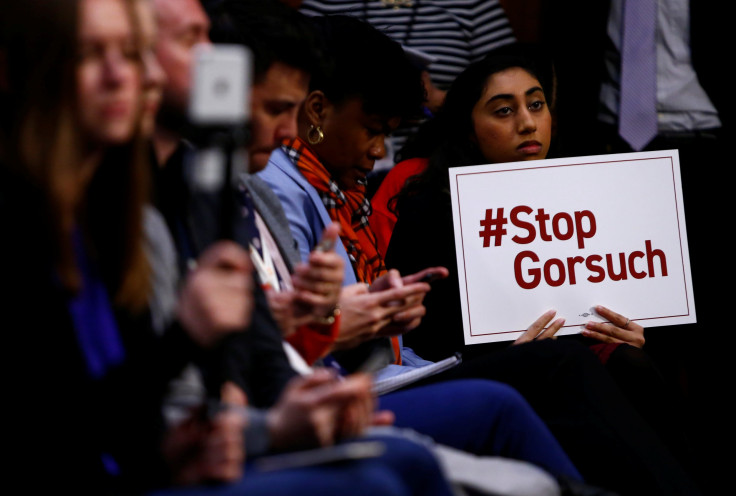Who Voted Against Gorsuch? Full List Of Senators Who Opposed Trump’s Supreme Court Nominee

The Senate went “nuclear” Thursday afternoon with a party-line vote to lower the threshold needed to confirm President Donald Trump’s Supreme Court Justice Nominee Neil Gorsuch to a simple majority of 51 votes from the previous requirement of 60 votes. The New York Times provided a full list of how each of the 100 senators voted here.
Senate votes 52-48 to trigger the nuclear option and lower threshold for SCOTUS noms to simple majority
— Alex Bolton (@alexanderbolton) April 6, 2017
Earlier Thursday, Democrats successfully blocked a vote to end their filibuster, a tactic senators often use to prevent or delay a proposal or confirmation. However, Democratic Senators Joe Donnelly of Indiana, Heidi Heitkamp of North Dakota, Joe Manchin of West Virginia and Michael Bennet of Colorado voted with their Republican counterparts to bring the filibuster effort to a close.
Read: Gorsuch Rulings On Frozen Trucker, Autism Education Cases Could Sink Nomination
As part of a procedural strategy, Senate Majority Leader Mitch McConnell voted with the Democrats to continue the debate, giving himself the opportunity to call for a vote to reconsider the decision to keep the debate going. That motion passed 55-45, with Donnelly, Heitkamp and Manchin defecting once more.
A vote to postpone Gorsuch’s nomination, in line with the Democrats’ desire to wait until the Federal Bureau of Investigation’s inquiry into the administration’s ties to Russia comes to a close, failed, with the Democrats unanimously voting in favor and the Republicans all voting against the proposal. Following the tally to maintain the 60-vote threshold, which was equally split between the parties, Donnelly, Heitkamp and Manchin once again joined the Republicans in a vote to end the debate for the day. A final vote on Gorsuch’s nomination was slated for Friday, according to the Times.
Republicans criticized their opponents for what Sen. Johnny Isakson (R-Ga.) called “blind obstruction.” But Democrats fired back, labeling the attempt to lower the confirmation vote threshold a violation of Senate rules and described their opposition as having more to do with the nominee himself than a partisan skirmish.
#Gorsuch: I am extremely disappointed by the blind obstruction carried out by Senate Democrats today. STATEMENT: https://t.co/urGNytVkhJ
— Johnny Isakson (@SenatorIsakson) April 6, 2017
Truly sad Dems filibustered such a qualified nominee, now Republicans are left w/ no choice but to move to 51 vote for #SCOTUS confirmation
— Kelly Ayotte (@KellyAyotte) April 6, 2017
Republicans have again chosen not to listen to the American people. This time breaking Senate rules & defying tradition to approve Gorsuch
— Sen. Maria Cantwell (@SenatorCantwell) April 6, 2017
Every Supreme Court nominee in the past quarter-century showed they could exceed the 60 vote threshold in the Senate.
— Senator Dick Durbin (@SenatorDurbin) April 6, 2017
As @SenateMajLdr kills a longstanding Senate rule to confirm a controversial judge, many recall how he used to feel about 60-vote threshold. pic.twitter.com/0zQW5gcMUG
— Sen. Patrick Leahy (@SenatorLeahy) April 6, 2017
If Gorsuch cannot muster 60 votes, the problem isn't with the process, it's with Trump & GOP's nominee. #StopGorsuch https://t.co/mWNbwsvy7t
— Ed Markey (@SenMarkey) April 6, 2017
Read: How Supreme Court Nominee Neil Gorsuch Could Change Labor
After the death of the late conservative Supreme Court Justice Antonin Scalia in February 2016, McConnell stated bluntly that he wouldn’t bother allowing a hearing for then-President Barack Obama’s moderate pick, Merrick Garland. Many, including the New York Times’ editorial board, have referred to the tie-breaking Supreme Court seat, now likely to be filled by Gorsuch, as “stolen” by the Republicans.
© Copyright IBTimes 2024. All rights reserved.






















